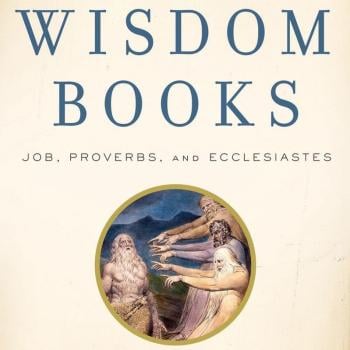(The following are the summaries of Jerry Walls chapters by Jerry himself).
CHAPTER SUMMARIES
Chapter One: What We Have in Common
This chapter simply aims to highlight our love and respect for our Roman Catholic brothers and sisters. Indeed, it is important to keep in mind the large areas of agreement between us in both doctrinal and moral teaching. What we share is far more important than our differences. We fully embrace our Roman Catholic brothers and sisters as full members of the body of Christ, despite our differences.
Chapter Four: Rome or Nothing?
A common Roman apologetic ploy is to argue that Protestants are hopelessly inconsistent if they accept the authority of scripture, the New Testament canon, and the classic creeds, but reject the claims of Rome. Accepting these things, so they argue, is to accept the authority of the Church; and if one recognizes the authority of the church in these matters, one must go the whole way with Rome, or lack a principled place to stand. This argument is common not only with popular apologists, but has also been deployed by distinguished theologians, including John Henry Newman in his famous book on doctrinal development. This chapter critiques various versions these “all or nothing” arguments. Newman’s argument is shown to be badly confused at a number of points. He confuses and conflates very different views of doctrinal development, some of which are quite sensible but others of which are extravagant and overreaching. The chapter concludes by noting the spiritually and intellectually hazardous nature of these “all or nothing” arguments that generate a structure of belief that is fragile and vulnerable to implosion.
Chapter Five: Revelation, Biblical Authority and Creed: How to Affirm Catholic Faith Without Affirming the Claims of Rome
This chapter builds on the previous one by arguing that on Protestant principles we have good grounds for discerning the New Testament canon and affirming the authority of the classic creeds (particularly the Nicene creed). If God revealed himself in Scripture, there is every reason to believe that revelation will be correctly discerned by the recipients of that revelation. “Reveal” is an achievement verb. If the revelation is not understood by the recipients, it does not count as revelation. It would make little sense for God to inspire scripture as an infallible authority for doctrine and morals, and then leave it to chance whether or not the inspired books were correctly recognized and included in the canon. Moreover, if Scripture is revelation, its central teachings must be correctly understood by the recipients of the revelation. The Protestant principle of the perspicuity of Scripture does not mean everything is clear, or equally clear, but that the central truths necessary for salvation will be properly grasped. This gives us reason to accept the classic creeds as faithful statements of essential claims about Christ, the Trinity and salvation. This chapter also continues the critique of “all or nothing” arguments by arguing that Roman Catholic Marian dogmas do not have the same sort of claim to authority as the classic creeds.
Chapter Eight: “You are Your Own Pope”: The Tu Quoque Objection
Tu quoque is a Latin phrase that means “you too,” and it refers to an informal fallacy that is committed when one responds to a criticism not by answering it, but by accusing one’s critic of the same thing. “I’m a liar huh? Well so are you”! In Roman-Protestant dialectics, it comes into play when Protestants are accused by Roman Catholics of having no real authority except for their own individual judgment of what seems true to them. The charge is that every Protestant is his own pope, so to speak. The tu quoque response is to reply that Roman Catholics must also exercise personal judgement when they choose to accept the authority claims of Rome. Roman Catholics allege that they are not vulnerable to this reply since they have in fact discovered the Church that Christ founded, with magisterial authority that goes back to the apostles. This chapter argues that there is an inescapable dimension of personal judgment for Roman Catholics, and they do not in fact have a privileged claim to having discovered an objective authority. In that sense, all of us are our own pope. Indeed, Roman Catholic converts must exercise judgment on a large group of complex issues when they judge that they have discovered the one true Church with apostolic authority, so the tu quoque objection is sustained.
Chapter Thirteen: Papal (Im)Probabilities
This chapter employs probability theory to reiterate in formal terms two of the main lines of argument of the previous two chapters on the papacy. First, it develops an argument from silence that meets the stringent criteria for such arguments. The argument proceeds from the fact that there were four noted Christian authors well placed to have known if there a monarchical bishop in Rome in the late first century and early second century: Clement of Rome, Hermas, Ignatius, and Justin Martyr. All of them were familiar with church life in Rome and wrote about it. We judge that it is probable that they not only would have known that there was a monarchical in Rome if there was one, but that they would have recorded this significant fact in their writings, and that this this writing would have survived. That fact that there are several such potential witnesses to a monarchical bishop increases the probability that at least one of them would have recorded this fact in a surviving document. The fact that none of them did renders is highly improbable that there was a monarchical bishop in Rome at the time. Next, we advance a probability argument from the fact that a number of popes in history have been immoral characters far more interested in power, pleasure and wealth than spiritual leadership. In particular, we pose the issue this way:
If (A) the pope is the “chief shepherd,” the “vicar of Christ” and the papacy was instituted by Christ to play the essential role of leading the Church and protecting it from doctrinal and moral error, and God has providentially secured an unbroken line from Peter to the present day, then (B) surely all popes down the ages would at the least be persons whose lives overall were marked by moral integrity and a sincere love for Christ and the gospel.
In short, how probable do you judge (B) to be true, given (A)? We judge it to be highly probable. Unfortunately, however, as noted, history shows that (B) is not true. If you agree that (B) is highly probable given (A), you have good reason to think (A) is probably not true since (B) is false. The combined upshot of these two arguments is that Roman Catholic claims about the papacy are very probably false.
Chapter Fourteen: Protestants in the Crosshairs: Popular Roman Catholic Apologetics
While most of this book focuses on scholarly sources, this chapter examines some popular Roman Catholic apologetics books aimed to convert Protestants to Rome. The aim is to see what sort of claims and arguments thrive in popular Roman apologetics, as well as to assess those arguments. The unfortunate reality is that these books are full of caricatures of Protestant views, question begging, simplistic historical claims, “all or nothing” arguments and the like. This chapter shows how this sort of literature harms Christian unity and poses serious problems for the project of ecumenical apologetics in service to “mere Christianity.” We conclude with some practical prescriptions for readers of these apologetics books who are likely attracted to them because they have contracted a bad case of “Roman fever.” First, do not fall into the mind-set of comparing the worst of Protestantism with the best of Roman Catholicism. Second, keep squarely in mind that one can embrace a fully catholic faith without going to Rome. Firmly resist any attempt to drive a wedge between traditional catholic orthodoxy and Protestantism. Third, understand that by embracing a vision of the church catholic that is larger than Rome, you can celebrate and draw spiritual and intellectual nourishment from the whole host of theologians, saints, martyrs, and artists who have given eloquent witness to classic Christian faith in their lives, writings, and art. Just as Protestant CS Lewis is a gift to all of us, so is Roman Catholic JRR Tolkien. Fourth, think carefully about the implications for the Christian community that nourished you before you join a church that does not recognize your spiritual fathers and mothers as full members of the one true church. To join a church that excludes such persons from the family communion table is to sever important spiritual bonds and to become less catholic, not more.
Chapter Twenty: The Deeply Divided Church of Rome: The World’s Largest Pluralist Christian Denomnation?
Many Protestants who “convert” to Rome do so because they are frustrated with the lack of discipline and the doctrinal confusion they have witnessed, particularly in liberal Protestant churches. They believe that by embracing Rome, they will avoid these problems, and indeed, Roman apologists like to depict their church as a bulwark of unchanging truth and consistency. In reality, however, we argue that the Roman Catholic church is not only deeply divided, but that it is very much like a liberal Protestant denomination. A significant majority of Roman Catholics hold moral views more in line with liberal Protestants than with conservative evangelicals. Most Roman Catholics are not only “functional Protestants,” but functional liberal Protestants. Roman Catholic educational institutions have numerous faculty that do not adhere to even fundamental Christian orthodoxy, let alone the distinctive claims of Roman Catholicism. And so on. So prospective “converts” to Rome should not be under the illusion that Rome is the panacea to cure all the ills they disdain in Protestantism.















